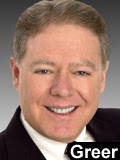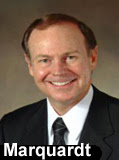 A Tuesday forum for actual and potential Republican candidates for the Second Congressional District seat being vacated by Steve Pearce revealed a wide-open race with at least nine people running or seriously considering running.
A Tuesday forum for actual and potential Republican candidates for the Second Congressional District seat being vacated by Steve Pearce revealed a wide-open race with at least nine people running or seriously considering running.
Those who had publicly declared that they’re running before the forum in
 Sowards, who secured 30 percent of the vote at the preprimary nominating convention that year, said after Tuesday’s forum that many high-profile Republicans tried to keep him off the ballot, and after losing to Skeen he switched his registration to independent. He switched back to Republican on Friday.
Sowards, who secured 30 percent of the vote at the preprimary nominating convention that year, said after Tuesday’s forum that many high-profile Republicans tried to keep him off the ballot, and after losing to Skeen he switched his registration to independent. He switched back to Republican on Friday.
“I’m a Republican at heart. The Republican Party has kind of left me,” he said. “Independent is what I really am.”
(Note, Dec. 13, 9:45 a.m.: Sowards contacted me after this article originally published to tell me that he meant to say, “Conservative is what I really am.” Since that made more sense in the context of the first half of this quote than what he originally said, I find it perfectly plausible that he misspoke and agreed to add in this note.)
The forum also revealed new details about several potential candidacies:
 • Former state Rep. Terry Marquardt said during his opening statement that “the reason I’m a candidate for the United States Congress is because I still have a capacity to serve.” Despite that, Marquardt said afterward that he hasn’t made a final decision on whether to run.
• Former state Rep. Terry Marquardt said during his opening statement that “the reason I’m a candidate for the United States Congress is because I still have a capacity to serve.” Despite that, Marquardt said afterward that he hasn’t made a final decision on whether to run.
“At this point, I’m seriously considering it,” he said. “I’ve put a lot of thought in the issues. … It’s an important decision for both me and my family, as well as for
•
 • Clint Chandler, a staffer in the
• Clint Chandler, a staffer in the
• Mike Kakuska, the Second Congressional District Vice Chair for the state GOP, attended the forum to tell candidates that the state party appreciates those who are running and to urge them to keep the campaign clean. Though he didn’t participate in the forum, he told those in attendance that he is considering running.
“We’re thinking about it. We’re not part of the candidate forum,” he said. “It’s a little too early.”
• Hobbs Mayor Monty Newman didn’t attend the forum, but confirmed Tuesday during a phone interview that he is seriously considering running. Several GOP insiders say they expect him to run.
“I am strongly considering it. My family and I have been discussing it at great length with close friends, and I am very strongly considering the race,” Newman said.
He didn’t attend the forum, he said, because he’s not a declared candidate.
Immigration and border security
Hot topics discussed at the forum included immigration and border security, health care, welfare, education and faith.
The four candidates who participated in the forum said they oppose amnesty for undocumented immigrations. Marquardt said amnesty would send a message “that we do not enforce our laws” and lead to more illegal immigration.
Greer agreed, and said he also does not think children born in the
Cornelius said he would address the problem of illegal immigration by building a border fence, then enforcing laws related to employing illegal immigrants. He said the
Sowards suggested moving military training facilities to the border, saying their presence would help combat illegal immigration. He also said the
“As good neighbors, we have an obligation and a benefit for helping them,” he said.
Health care
Cornelius, asked about health care, said he favors a single-payer plan.
“I believe you should choose your insurance,” he said. “Health care is important, but it’s something that needs to be out of the hands of the insurance companies and into the hands of the individuals.”
Greer described the cost of health care as a complex problem stemming from issues with insurance companies, hospitals and doctors and lawsuits. He said health care must remain privatized, saying that’s “where the innovation will come from.”
“If you think health care is expensive now, just wait until the government tells you it’s free,” he said. “If you think it’s bad here, look at
Marquardt said he opposes government-run health insurance, but said he would support tax incentives and health-savings accounts, combined with “catastrophic-event” insurance, to improve the system.
Marquardt said such a system would ensure that Americans have choices.
Sowards said he and his family have gone without insurance at times because of the expense, but said, in light of 21st Century technology that can “keep people alive forever,” the government must practically consider the cost versus the benefit of various options to improve the system.
Welfare and other government assistance
In response to a question about welfare and other government assistance, Sowards said such programs should be community-based, not administered by the federal government.
“I think neighbors can help solve those kinds of problems,” he said. “We need to do it locally.”
Greer said he favors government assistance programs, saying there are some people who genuinely need temporary help.
“But that’s the point: We give it to them until they’re giving back to society, not so they keep taking it,” he said. “I’m not going to vote for a hand out, but I will vote for a hand up.”
Marquardt said the best ways to help those in need are through economic development – accompanied with education and job-training programs – and giving assistance in exchange for temporary work for the government.
Marquardt said the second would motivate people to seek higher-paying jobs in the private sector.
Cornelius said he believes that “every able man should work,” saying assistance should come with stipulations. He also said churches, not the government, should provide such assistance.
“At one time in this country, the churches took care of the people,” he said. Now, we’ve relied on the government, and we’ve got it backwards.”
Education
Asked about education, Greer said the idea behind the No Child Left Behind Act was “probably good,” but education is an issue that should be addressed locally. He said one of the biggest problems with the nation’s education system is unions.
“It becomes a political issue instead of what the child needs,” he said.
Cornelius agreed that education should be a local issue. He advocated for school choice, allowing parents to choose public, private or home schooling for their children.
Sowards said he supports abolishing the federal Department of Education and giving locals control over schools.
“If we’re not interested in the education of our children, then we’re going to pay the price for that,” he said.
Marquardt said parents “are the most important teachers in a child’s life.”
Faith
Asked about his personal faith, Cornelius said he’s a Baptist and said his faith “helps guide my life.” He said he grew up “knowing that Jesus Christ was the answer and he was my way into heaven.”
As a member of the Church of Jesus Christ of Latter-Day Saints, Greer called himself a “very active Christian,” and said he is “very devout.”
Sowards, also a member of the LDS church, said he does “accept Jesus Christ as my savior,” and said his children are all active members of the church, which he called “a testament to my faith.”
Marquardt called himself a Christian, and said he believes “that this country was founded on inalienable rights that we are all equal.” Asked about Prayer in schools, Marquardt said the Constitution grants religious freedom, and “we should not abandon those principles that brought our forefathers here.”
Sowards said it should be up to states to decide whether to allow prayer in schools, saying the decision is “really none of
Greer said the founding fathers intended religious freedom, but not a separation between church and state. He said “individualized” prayer should be allowed in public schools.
Cornelius agreed.
“We’re one nation under God, as the pledge says, so there should be prayer in schools,” he said.
Here’s video of their opening statements:
Bob Cornelius
C. Earl Greer
Terry Marquardt
Greg Sowards